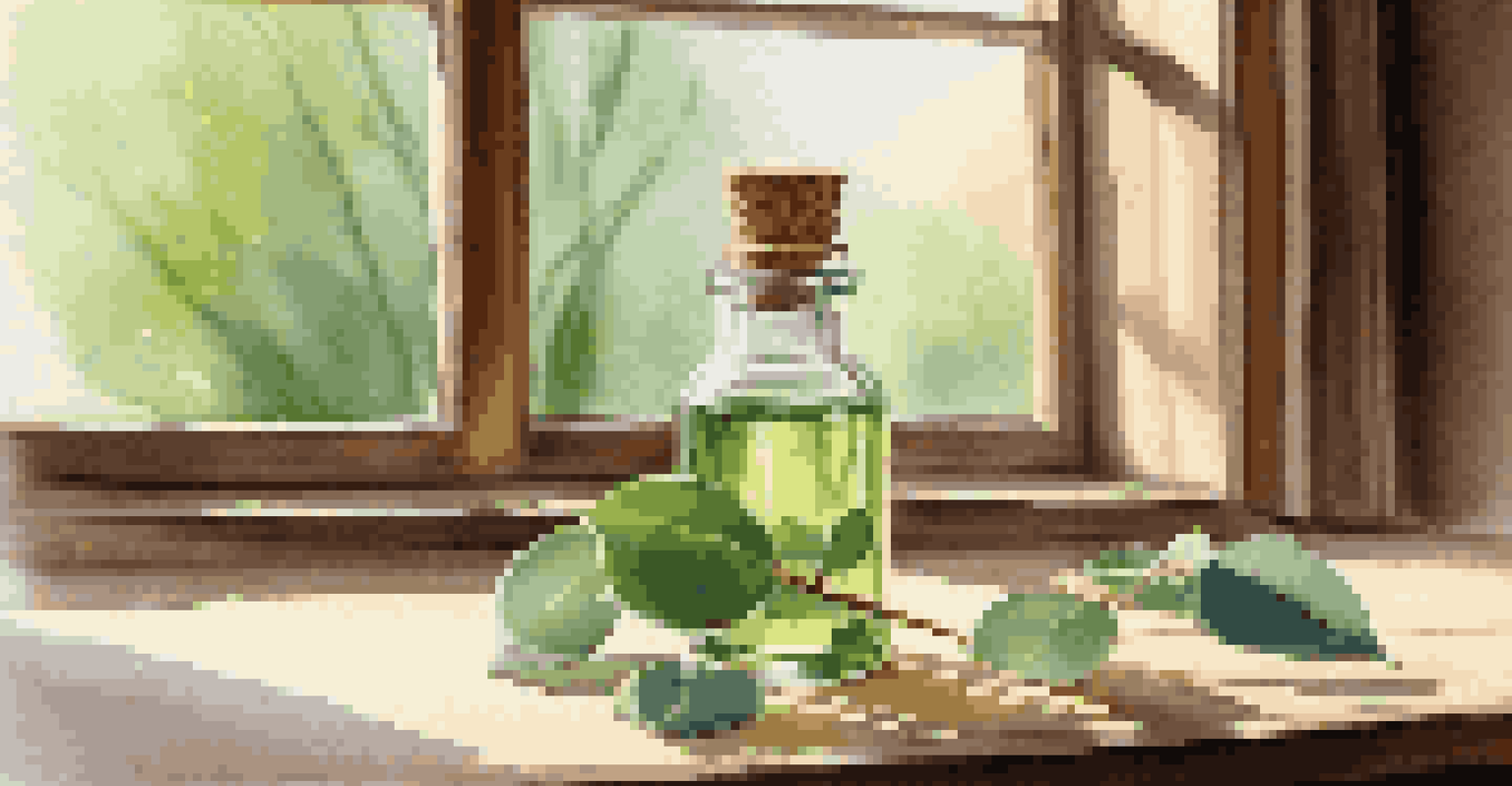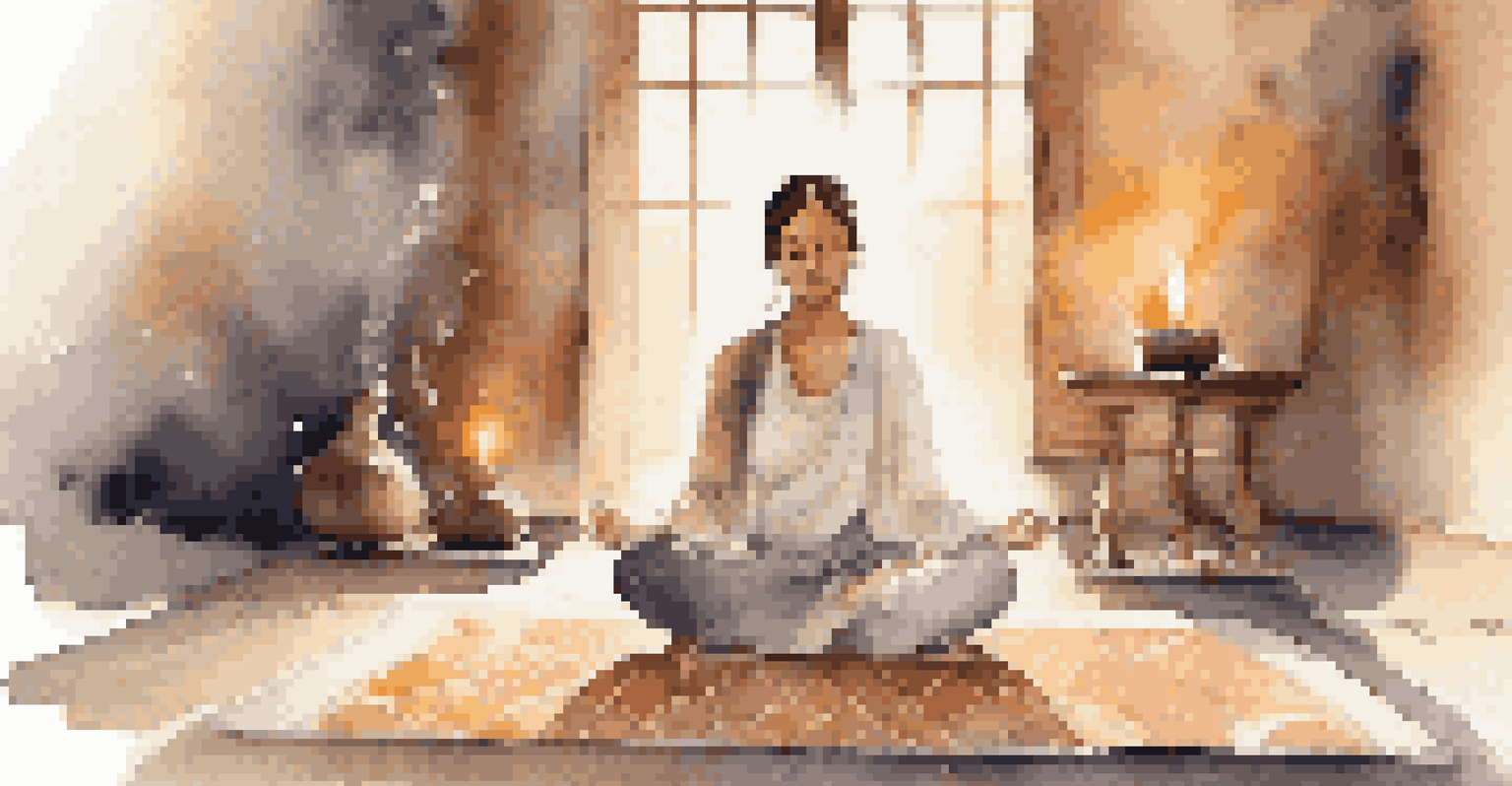Exploring the Benefits of Aromatherapy in Holistic Healing

What is Aromatherapy and Its Role in Holistic Health?
Aromatherapy is a therapeutic practice that utilizes essential oils to promote physical and emotional well-being. By harnessing the fragrant properties of plants, aromatherapy aims to create a holistic healing experience that addresses both the mind and body. This approach aligns perfectly with holistic health principles, which focus on treating the whole person rather than just symptoms.
The use of essential oils can empower individuals to take charge of their own well-being.
For example, when you inhale the soothing scent of lavender, it may help reduce anxiety and promote relaxation. This simple act can have a profound impact on your overall health, showcasing how aromatherapy serves as a complementary tool in holistic practices. The idea is that by engaging the senses, we can foster a deeper connection to our well-being.
Incorporating aromatherapy into your routine can be as easy as using a diffuser or adding a few drops of essential oil to a warm bath. This accessibility makes it an appealing option for those looking to enhance their holistic healing journey.
The Science Behind Aromatherapy and Its Effects
Aromatherapy is more than just pleasant scents; it's backed by science. Research shows that essential oils can influence brain chemistry, particularly areas linked to mood and emotions. When inhaled, these compounds can stimulate the limbic system, which plays a crucial role in emotional regulation.

For instance, studies have indicated that peppermint oil can enhance cognitive performance, while chamomile is known for its calming effects. This scientific foundation helps explain why many individuals find relief from stress or anxiety through the use of essential oils. Understanding the science can empower users to select oils that align with their specific needs.
Aromatherapy Enhances Well-Being
Using essential oils can promote both physical and emotional health, making it a valuable part of holistic practices.
As we continue to explore the benefits of aromatherapy, it's essential to recognize that individual experiences may vary. Tailoring your choices based on personal preferences and desired outcomes can lead to more effective healing.
Popular Essential Oils and Their Healing Properties
There are countless essential oils available, each boasting unique properties. Some of the most popular oils include lavender for relaxation, eucalyptus for respiratory health, and tea tree for its antiseptic qualities. Familiarizing yourself with these oils can enhance your holistic healing practices.
Aromatherapy is not a substitute for medical treatment, but it can be a wonderful complement to traditional care.
For example, if you're struggling with insomnia, incorporating lavender essential oil into your bedtime routine may help create a peaceful environment. Alternatively, eucalyptus oil can be beneficial during cold and flu season, providing relief from congestion. This versatility demonstrates how essential oils can be seamlessly integrated into daily life.
It's important to remember that the power of these oils lies not only in their individual properties but also in how they can be combined. Blending oils can create synergistic effects, offering even greater benefits when tailored to specific needs.
How to Safely Use Essential Oils for Healing
While essential oils offer numerous benefits, it's crucial to use them safely. Always dilute essential oils with a carrier oil, such as coconut or jojoba oil, before applying them to the skin. This practice helps prevent irritation and ensures that you're enjoying the full benefits without adverse effects.
Additionally, some oils can trigger allergies or sensitivities, so it's wise to conduct a patch test before widespread use. This precaution allows you to gauge your body’s reaction and adjust your usage accordingly. Being mindful of these safety measures can enhance your aromatherapy experience.
Understanding Essential Oils' Science
Research shows that essential oils can positively influence brain chemistry, aiding in mood regulation and stress relief.
Furthermore, pregnant women, children, and individuals with certain health conditions should consult a healthcare professional before using essential oils. This step ensures that your holistic healing journey remains safe and effective.
Incorporating Aromatherapy into Daily Routines
Integrating aromatherapy into your daily routine can be both enjoyable and beneficial. Start by creating a calming environment in your home with a diffuser, selecting essential oils that resonate with you. This simple addition can transform your space into a sanctuary of relaxation.
Another effective method is to use essential oils during your self-care rituals. For instance, adding a few drops of your favorite oil to a warm bath or using them in massage can enhance the experience. This not only promotes relaxation but also reinforces the connection between body and mind.
Lastly, consider carrying a roll-on blend of essential oils in your bag for on-the-go relief. This allows you to manage stress or anxiety in real-time, making aromatherapy a practical tool in your holistic healing toolkit.
Mindfulness and Aromatherapy: A Perfect Pair
Mindfulness and aromatherapy complement each other beautifully, enhancing your overall well-being. When you practice mindfulness, you're encouraged to be present and aware of your surroundings, making it the perfect time to engage your sense of smell. By incorporating essential oils into your mindfulness practices, you can deepen your experience.
For instance, during meditation, using grounding oils like sandalwood or frankincense can help center your thoughts and enhance your focus. The scents can act as anchors, guiding you back to the present moment whenever your mind begins to wander. This fusion of practices can lead to a more profound sense of peace and tranquility.
Safe Use of Essential Oils
Proper dilution and awareness of allergies are crucial for safely enjoying the benefits of essential oils in aromatherapy.
Additionally, simply taking a moment to inhale your chosen essential oil can serve as a mindfulness exercise in itself. This brief pause can help you reconnect with your body and emotions, fostering a holistic approach to healing.
Final Thoughts on Aromatherapy in Holistic Healing
Aromatherapy is a powerful ally in holistic healing, offering a myriad of benefits that can enhance your overall well-being. By understanding how to effectively use essential oils, you can create a personalized healing journey that addresses your unique needs. Remember, the key is to listen to your body and experiment with different oils and techniques.
As you explore the world of aromatherapy, consider it a journey rather than a destination. The more you learn and experience, the more you can tailor your practices to suit your lifestyle. This adaptability is one of the many reasons aromatherapy remains a popular choice for those seeking holistic health.

Ultimately, embracing aromatherapy can lead to a richer, more fulfilling healing experience. So take a deep breath, explore your options, and enjoy the therapeutic benefits that await you in this fragrant world.